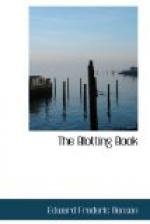Mr. Taynton, on his arrival back at Brighton that afternoon, devoted a couple of solitary hours to such thoughts as these, and others to which this tragedy naturally gave rise and then with a supreme effort of will he determined to think no more on the subject. It was inevitable that his mind should again and again perhaps for weeks and months to come fall back on these dreadful events, but his will was set on not permitting himself to dwell on them. So, though it was already late in the afternoon, he set forth again from his house about tea-time, to spend a couple of hours at the office. He had sent word to Mr. Timmins that he would probably come in, and begin to get through the arrears caused by his unavoidable absence that morning, and he found his head clerk waiting for him. A few words were of course appropriate, and they were admirably chosen.
“You have seen the result of the inquest, no doubt, Mr. Timmins,” he said, “and yet one hardly knows whether one wishes the murderer to be brought to justice. What good does that do, now our friend is dead? So mean and petty a motive too; just for a watch and a few sovereigns. It was money bought at a terrible price, was it not? Poor soul, poor soul; yes, I say that of the murderer. Well, well, we must turn our faces forward, Mr. Timmins; it is no use dwelling on the dreadful irremediable past. The morning’s post? Is that it?”
Mr. Timmins ventured sympathy.
“You look terribly worn out, sir,” he said. “Wouldn’t it be wiser to leave it till to-morrow? A good night’s rest, you know, sir, if you’ll excuse my mentioning it.”
“No, no, Mr. Timmins, we must get to work again, we must get to work.”
Nature, inspired by the spirit and instinct of life, is wonderfully recuperative. Whether earthquake or famine, fire or pestilence has blotted out a thousand lives, those who are left, like ants when their house is disturbed, waste but little time after the damage has been done in vain lamentations, but, slaves to the force of life, begin almost instantly to rebuild and reconstruct. And what is true of the community is true also of the individual, and thus in three days from this dreadful morning of the inquest, Mr. Taynton, after attending the funeral of the murdered man, was very actively employed, since the branch of the firm in London, deprived of its head, required supervision from him. Others also, who had been brought near to the tragedy, were occupied again, and of these Morris in particular was a fair example of the spirit of the Life-force. His effort, no doubt, was in a way easier than that made by Mr. Taynton, for to be twenty-two years old and in love should be occupation sufficient. But he, too, had his bad hours, when the past rose phantom-like about him, and he recalled that evening when his rage had driven him nearly mad with passion against his traducer. And by an awful coincidence, his madness had been contemporaneous with




